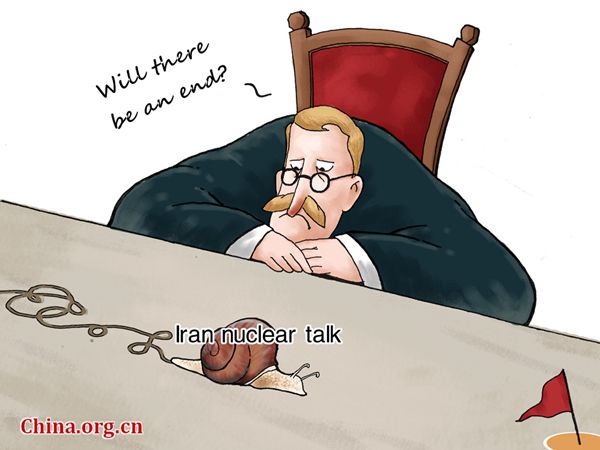Iran-US détente and its impact on the Arab world
- By Jin Liangxiang
 0 Comment(s)
0 Comment(s) Print
Print E-mail China.org.cn, December 25, 2014
E-mail China.org.cn, December 25, 2014
|
[By Zhai Haijun/China.org.cn] |
The ongoing Iran nuclear negotiation and the détente in the relations between Iran and the West are recent dynamics that may have the most profound impact on the Middle East, and the geopolitical standings of the Arab world will be further undermined.
It is true that mutual suspicion between the United States and the West at large and Iran will still exist for a rather long period of time. Mainstream American society still holds the traumatic memory of the hostage crisis of 1979, as is evident in the Oscar movie "Argo" and the U.S. refusal of Hamid Aboutalebi's candidacy as Iran's envoy to the UN. Pro-Israel Congressmen still believe that Iran has a hidden agenda of developing nuclear weapons.
On the Iranian side, many hardliners still regard the United States as a hegemonic and arrogant power that intends to deprive Iran of the rights of economic progress. And members of the Iranian elite still believe that fighting against the United States is a part of the country's efforts to seek independence. Iran is also very sensitive about U.S. military bases and the U.S. presence in its neighborhood.
Albeit these negative perceptions, administrative branches of both sides seemed to be determined to reverse the distrustful relations after more than three decades of disengagement and hostility. The U.S. administrative team, led by Barack Obama, regards the détente as one part of its regional arrangements so as to shift strategic resources to the Asia Pacific region.
Obama might also take it as a heroic movement a great leader could have to open up and normalize relations with a long-time enemy. With only two years in office left, Obama is eager to leave a presidential legacy. By ordering the restoration of U.S.-Cuba relations, he is openly in defiance against the Republicans. He is expected to deliver the same kind of defiance in Iran issues. Judging by these steps, a nuclear deal will not be impossible, and even steps to normalize relations would not come as a surprise.
Hassan Rouhani is a pragmatist with a reformist mind. His election is not an individual event but signifies a trend of liberalism in Iran. Both Rouhani and his foreign minister strongly believe in constructive interaction or engagement with the outside world; the United States and the West in particular. They believe that Iran cannot develop in isolation.
It is reported that Hassan Rouhani will sign the deal even knowing Barack Obama cannot carry out commitments to remove the sanctions. He understands that Iran cannot waste more time integrating into the global system.







Go to Forum >>0 Comment(s)